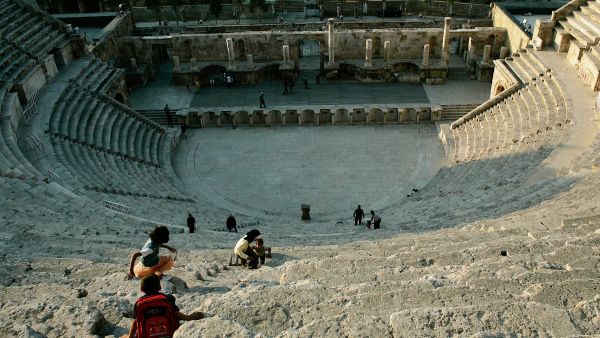When young actor Ahmad Srour and a group of performers first went to the street in 2010 to say "yes to hunger and poverty" and "no to freedom and democracy", their performance grabbed the attention of every passer-by.
Over a year later, members of the Street Theatre group are still using the street as their stage, employing black comedy to "voice the concerns of citizens" and shock Jordanians into action, according to Srour.
Breaking the fourth wall that separates them from their audience, the group’s three performers, Srour, Suliman Zawahreh and Amjad Hijazin, script about half of each performance and leave the rest to improvisation in order to incorporate interactions with their audience.
"We are not dealing with our performance as art, but as a social need and a state of awareness. It is one of the steps towards reform in this country," Srour told The Jordan Times in a recent interview.
"If you want reform, you need art, culture, and strong and free media; without them, nothing happens," he added.
"We are part of the trinity of cultural reform."
When performing on the street, the three choose a suitable spot, announce their intention to those on the street and then proceed with their performance.
Srour, a theatre arts graduate from the University of Jordan, said the audience’s initial reaction is typically surprise, followed by further interest and interaction.
"We have not received any negative response from the audience so far and their interaction has always been enriching, extending most performances beyond their planned length," he noted, adding that there is no use in worrying over the audience’s reaction.
"We perform; we know what we are talking about, and we are being professional about it. We never think of the possible dangers or threats. If we think too much about it, we will never perform. Our motto is ‘don’t think; act’.’"
"Every show is unique in its own way because we improvise. This also prepares us to deal with any reaction from the audience," Srour explained.
Having staged over a dozen performances, the Street Theatre group has performed on the streets, at sit-ins and demonstrations, and at local theatres and galleries.
"Our shows at theatres help us sustain our performances on the street," Srour said.
In one of their performances on stage, the trio put on a play at the Jordan Youth Forum 2011 in June, with His Majesty King Abdullah in the audience.
Their performance criticised social divisions through the lens of the feud between Jordanian fans of rival Spanish football clubs Real Madrid and Barcelona. Srour said they performed what they wanted, the way they planned it.
"We perform something that people live through, not something that people would like to hear. We are not telling them a romantic story and we are not making them laugh pointlessly," he stressed. "If that is art, we are not artists."
With Hijazin still at university and Srour and Zawahreh working as a professional actor and a schoolteacher respectively, the three perform what they like to call "stand-up tragedy" in their free time.
"At the end of the day we are not stars; we are citizens. We perform as citizens first and foremost," Srour noted.
"We first thought of this method in April 2010 to voice the concerns of the average citizen. We as citizens were drawing from our experience, and we realised we have sufficient space to express ourselves and our concerns."
"We don't aim to create something infinitely creative or to start a trend in local theatre," Srour told The Jordan Times.
"We want to surprise people and make them think of their problems. Once we manage that, and when surprise is no longer an element, we will change our approach."
To maintain a broad perspective, the young performers consult with Jordanian author Mifleh Odwan, an older and more seasoned artist.
"For our performances to reach a level of professionalism, we need the input of a professional like him. He adds professionalism, while we give energy and unique new ideas," Srour elaborated.
He added that local directors and actors have extended support and encouragement to the Street Theatre troupe.
"There are some who don't agree with our approach, but they don’t affect us. If our theatre had no impact, we would have stopped it ourselves."
For 2012, the Street Theatre group has finished shooting 30 five-minute sketches on video with financial support from the King Abdullah Fund for Development and are seeking a channel through which to distribute them. The troupe also plans to reach out to the Kingdom's governorates.
"Most of our performances have been in the capital, so we are hoping that we manage to go on a tour and perform 12 shows, one in each governorate," he said.
But Srour stressed that the Street Theatre group is not about politics.
"We are very different in our political thoughts, but we have the same concerns as citizens."
"Poverty and hunger are the same regardless of one’s political thoughts. If someone is a leftist for example, does that mean he doesn’t go hungry?"
By Rand Dalgamouni








